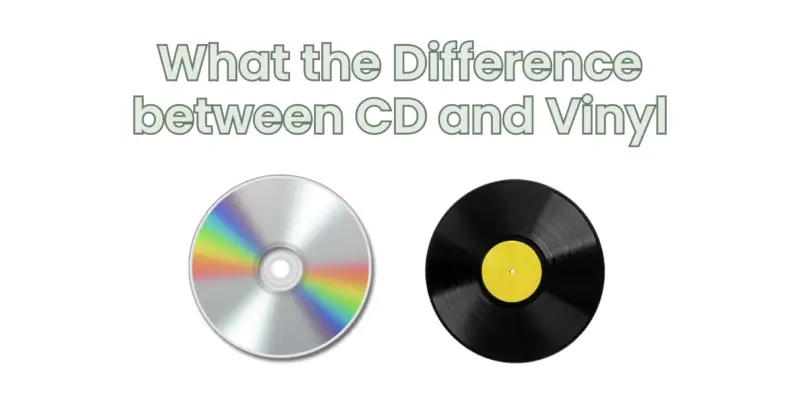In an era dominated by digital music streaming, two physical formats have stood the test of time: the compact disc (CD) and vinyl records. While both formats serve the purpose of delivering music to our ears, they possess distinct characteristics that have garnered loyal followings among music enthusiasts. In this article, we will dive into the key differences between CDs and vinyl, examining their technology, sound quality, and overall experience.
- Technology and Recording Process:
The fundamental difference between CDs and vinyl lies in their technology and the way sound is recorded and reproduced. CDs are digital audio storage mediums that rely on digital encoding and laser technology. The audio content is sampled, converted into a series of 0s and 1s (binary code), and stored as a series of microscopic pits on the disc’s reflective surface. When played, a laser reads these pits and converts the digital information back into analog sound waves.
On the other hand, vinyl records are analog in nature. The sound is physically engraved onto the record’s surface as a continuous spiral groove. When a stylus or needle is placed in the groove, it vibrates and generates electrical signals that are then amplified and transmitted to speakers, producing sound.
- Sound Quality:
The debate surrounding CD vs. vinyl often centers around sound quality. Vinyl enthusiasts argue that analog sound offers a warmer, more authentic experience. Due to the continuous nature of the grooves, vinyl records capture a wider dynamic range and subtle nuances in the music, resulting in a potentially richer sound. Some claim that vinyl produces a certain “depth” or “presence” that digital formats can’t replicate.
CD advocates, however, contend that digital audio provides superior accuracy and fidelity. CDs have a high signal-to-noise ratio, meaning they produce minimal background noise and deliver cleaner sound reproduction. Digital formats also eliminate issues associated with vinyl, such as surface noise, pops, and clicks, which can result from scratches or dust particles.
It’s worth noting that advancements in digital technology have significantly improved the sound quality of CDs over the years. High-quality mastering techniques, higher bit rates, and lossless compression formats like FLAC have reduced the perceived gap between vinyl and digital audio.
- Durability and Longevity:
One area where CDs undeniably have an advantage over vinyl is durability. CDs are made of plastic and are relatively resistant to scratches, dust, and physical damage. With proper handling and storage, CDs can last for decades without noticeable degradation in sound quality. Vinyl records, being made of a softer material, are more prone to wear and tear. Even minor scratches or mishandling can result in audible clicks, pops, or even skipping during playback.
- Artwork and Collectibility:
Beyond sound quality, both CD and vinyl formats offer unique aspects to music enthusiasts. Vinyl records are often cherished for their large album artwork and liner notes, providing a visual and tactile experience that can be lacking in digital formats. Collecting vinyl has become a hobby for many, with limited editions, colored pressings, and rare releases driving the appeal for dedicated collectors.
While CDs may not offer the same visual impact as vinyl, they still present album art and packaging, albeit in a smaller format. CDs are generally more affordable and accessible, making it easier to build a comprehensive music collection.
- Convenience and Portability:
When it comes to convenience and portability, CDs have the upper hand. They are compact, lightweight, and easily playable in most CD players, car stereos, and computers. CDs can also be ripped into digital formats for storage on computers, smartphones, and portable music players, providing convenient access to a vast library of music.
Vinyl records, on the other hand, require a dedicated turntable and proper setup to be played. They are less portable and not as easily digitized, making them less convenient for on-the-go listening.
In conclusion, the difference between CDs and vinyl goes beyond the audio format itself. CDs offer digital precision, durability, and portability, while vinyl provides a nostalgic analog experience, often accompanied by unique artwork and collectibility. The choice between CD and vinyl ultimately depends on individual preferences, taking into account factors such as sound quality, aesthetic appeal, convenience, and the overall listening experience. Whether you find solace in the warmth of vinyl or prefer the accuracy of CDs, both formats continue to captivate music lovers around the world, proving that there is no one-size-fits-all solution in the realm of audio enjoyment.


